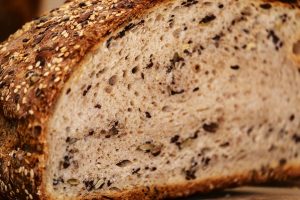 Clients all over Massachusetts have sent questions about the benefits of grains and some of the latest data on how grains may negatively affect health. Grains do cause some problems that may you lead to wanting to cut out all grains, but the answer isn’t that easy. Grains offer benefits. Not all grains are alike, nor do they affect all people in the same way. Refined grains, ones that have had two important parts removed, the bran and the germ, provide no benefits except calories. All that remains in the grain once it’s been refined is the starchy endosperm. The bran and the germ provide fiber, protein, fat, vitamins and mineral. If you want to be healthier, stick with whole grains and skip refined grains.
Clients all over Massachusetts have sent questions about the benefits of grains and some of the latest data on how grains may negatively affect health. Grains do cause some problems that may you lead to wanting to cut out all grains, but the answer isn’t that easy. Grains offer benefits. Not all grains are alike, nor do they affect all people in the same way. Refined grains, ones that have had two important parts removed, the bran and the germ, provide no benefits except calories. All that remains in the grain once it’s been refined is the starchy endosperm. The bran and the germ provide fiber, protein, fat, vitamins and mineral. If you want to be healthier, stick with whole grains and skip refined grains.
Digesting grains may be an issue.
Grains are harder to digest. Whether it’s whole grains or refined grains, they are hard on the digestive system. Grains with gluten are those that cause the most digestive problems. Grains are seeds and seeds often contain enzyme inhibitors. Those enzyme inhibitors maintain the integrity of the seed until conditions right for them to grow. Your body needs enzymes for digestion, so blocking them causes problems. The phytic acid in some grains also prevent the absorption of calcium, zinc, iron and magnesium.
There are ways to deal with some of the problems.
If you’re worried about the phytic acid, you can eliminate the problem with soaking, fermenting or sprouting the grain before using it. Sour dough bread or sprouted bread is one example. One reason people who use dry beans (which isn’t a grain, but is a seed) soak them, is to remove the high level of phytic acid. You can also choose from the ancient grains. Ancient grains have lower gluten content and don’t cause as much problem. They include grains like spelt, kamut, and einkorn.
There are even more reasons to limit processed grains.
The more complex a nutrient, the more difficult is to digest. Grains contain complex protein, like gluten that isn’t easily digested and can cause inflammation, autoimmune disease, allergies and leaky gut. Most of those problems come from gluten, but other types of grains have their own substances that are similar. The gluten in wheat contain prolamin gliadin. A similar prolamin is found in oats called avenin.
- Because each person is different, if you’re having digestive issues or other signs of gluten intolerance, always seek the help of a medical professional. In many cases, they’ll suggest an elimination diet to identify the cause of the problem.
- Getting the most from grains is all about processing. Vitamins B1, B2, B6, E, pantothenic acid, calcium magnesium, phosphorous, potassium, manganese, iron, sodium, zinc, cobalt, copper, fiber and molybdenum are all removed in processed grain.
- Grains have huge benefits. For instance, oats and whole grain barley can help lower cholesterol. One study showed that just eating a half cup of whole grain barley a day for five weeks lowered bad cholesterol by 10%.
- If you choose to make grain more easily digested by soaking it, you also get another benefit. It improves the vitamin C and B content, also boosting fiber, amino acids and folate.
For more information, contact us today at ProWeight Loss